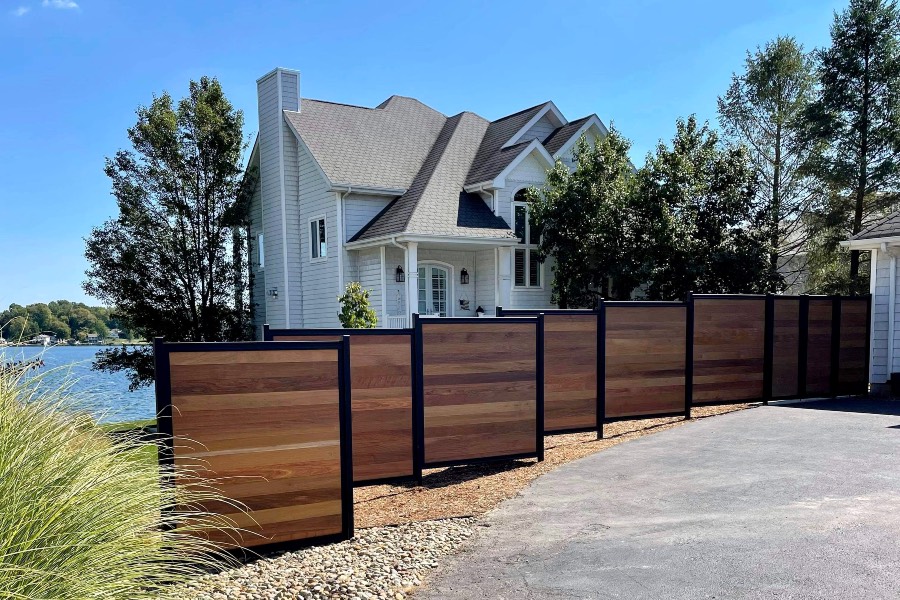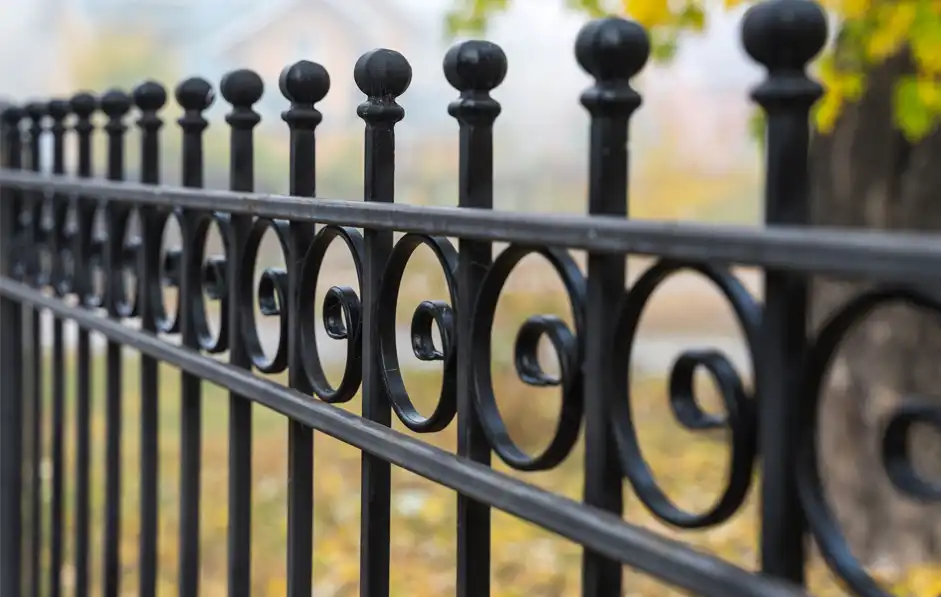All Categories
Featured
Picking the ideal fencing material for your building can be a daunting task with the variety of alternatives readily available. Whether you're intending to increase security, improve privacy, or improve the curb appeal of your home or company, the right fence can offer several functions. In this overview, we'll explore different secure fencing materials, their benefits, and which alternatives may be ideal suited for numerous needs.
Benefits:
Natural Look and Feeling: Wood offers a cozy, all-natural aesthetic that enhances gardens, yards, and various other outside spaces. Adjustable: You can discolor or paint timber surround any type of shade, enabling limitless design possibilities. Privacy and Security: When created as a strong panel, a wood fence can supply excellent privacy and safety. Drawbacks:
Maintenance Required: Timber fencings require periodic upkeep to avoid rot, warping, and damages from pests like termites. At risk to Weather: Direct exposure to sun, rainfall, and snow can deteriorate the top quality of the timber in time, which indicates you might require to reseal or change boards. Best For: Property owners looking for a typical, personalized fence with a natural look.
Benefits:
Sturdy and Long-Lasting: Plastic is unsusceptible to the weathering that wood fences experience, and it won't warp, fracture, or discolor. Reduced Upkeep: Unlike timber, plastic doesn't need discoloration or sealing. Cleansing it is as simple as washing it with water. Variety of Styles: Plastic fencing is readily available in many styles and shades, and some variations even resemble the look of wood. Drawbacks:
Greater Initial Cost: Vinyl fences can be extra expensive to mount compared to various other materials, such as timber or chain link. Prone to Fracturing: While durable, plastic can end up being fragile and crack in really cool temperatures or when struck with pressure. Restricted Modification: Unlike timber, plastic can't be easily changed, so your layout choices are much more restricted. Best For: Homeowners that focus on low upkeep and long-term toughness, and who agree to purchase a greater initial expense.
Benefits:
Budget Friendly: Among one of the most budget-friendly secure fencing choices, making it suitable for large homes or areas calling for substantial insurance coverage. Reduced Upkeep: Wire mesh fence call for little to no maintenance beyond periodic cleaning and repair services. Resilient and Secure: While not aesthetically attractive, chain link fences are solid, difficult to climb up, and offer a high degree of safety and security. Downsides:
![]()
Absence of Privacy: A wire mesh fence does not provide much privacy unless you add slats or various other modifications. Industrial Look: The wire mesh may not match all building types, especially household homes or locations requiring an aesthetic touch. Best For: Huge residential properties or locations where spending plan is a concern, or for those who require a solid, safe boundary without the requirement for personal privacy.
Advantages:
Strong and Secure: Steel fences provide outstanding security, as they are tough to climb and offer a durable obstacle versus trespassers. Long Lifespan: Metal fencings can last for decades, especially when dealt with for rust and rust resistance. Stylish Visual: Wrought iron and steel fences add an elegant, timeless aim to homes, yards, or business properties. Drawbacks:
Costly: Steel fences, particularly functioned iron, have a tendency to have a greater in advance price than other products. Maintenance Demands: Steel and functioned iron fences may rust gradually otherwise correctly maintained, calling for periodic painting or treatment. Limited Privacy: Metal fencings are normally open, so they do not use the privacy that strong fences like wood or vinyl can provide unless combined with other materials. Best For: Those looking for a high-security, ornamental alternative with a long lifespan, especially for high-traffic or upscale locations.
Benefits:
![]()
Reduced Upkeep: Composite secure fencing calls for no painting, staining, or sealing. It's easy to clean with just soap and water. Toughness: Resistant to rot, parasites, and weather condition, composite fencings last longer than conventional timber. Eco-Friendly: Many composite materials are made from recycled timber and plastic, decreasing environmental effect. Drawbacks:
Pricey: The initial cost of composite fence can be more than wood or vinyl. Minimal Modification: While offered in numerous shades, composite fencings don't offer as numerous design choices as wood. Heavy: Compound products are often much heavier than various other sorts of secure fencing, which can make installment extra hard. Best For: Those who want a low-maintenance, environmentally friendly alternative that combines the look of timber with increased resilience.
Conclusion. Selecting the right fence material for your residential property relies on a range of elements, including your budget, visual preferences, privacy requirements, and upkeep willingness. Whether you choose the timeless appeal of timber, the low-maintenance advantages of vinyl, the strength of steel, or the environment-friendly longevity of composite, picking the very best fence needs cautious consideration of your building's special needs. By comprehending the advantages and restrictions of each product, you can make an informed choice that provides long-lasting worth and contentment for your building.
- Timber Secure fencing. Wood secure fencing is a classic option for lots of homeowners as a result of its natural beauty, adaptability, and capability to blend seamlessly with various architectural designs. Readily available in a variety of styles, including ranch, picket, and personal privacy rails, wood can be tailored with paint or stain to match your desired visual.
Benefits:
Natural Look and Feeling: Wood offers a cozy, all-natural aesthetic that enhances gardens, yards, and various other outside spaces. Adjustable: You can discolor or paint timber surround any type of shade, enabling limitless design possibilities. Privacy and Security: When created as a strong panel, a wood fence can supply excellent privacy and safety. Drawbacks:
Maintenance Required: Timber fencings require periodic upkeep to avoid rot, warping, and damages from pests like termites. At risk to Weather: Direct exposure to sun, rainfall, and snow can deteriorate the top quality of the timber in time, which indicates you might require to reseal or change boards. Best For: Property owners looking for a typical, personalized fence with a natural look.
- Vinyl (PVC) Fence. Vinyl fencings have actually grown in appeal due to their low maintenance and toughness. Made from artificial plastic products, plastic fences are resistant to rot, fading, and insects, supplying a clean, modern-day appearance with little upkeep.
Benefits:
Sturdy and Long-Lasting: Plastic is unsusceptible to the weathering that wood fences experience, and it won't warp, fracture, or discolor. Reduced Upkeep: Unlike timber, plastic doesn't need discoloration or sealing. Cleansing it is as simple as washing it with water. Variety of Styles: Plastic fencing is readily available in many styles and shades, and some variations even resemble the look of wood. Drawbacks:
Greater Initial Cost: Vinyl fences can be extra expensive to mount compared to various other materials, such as timber or chain link. Prone to Fracturing: While durable, plastic can end up being fragile and crack in really cool temperatures or when struck with pressure. Restricted Modification: Unlike timber, plastic can't be easily changed, so your layout choices are much more restricted. Best For: Homeowners that focus on low upkeep and long-term toughness, and who agree to purchase a greater initial expense.
- Chain Web Link Secure Fencing. Chain link fencings are a cost-effective option for those looking for safety and security without the high cost. Commonly used in business residential properties, parks, and big houses, chain link fencings give an effective border and are offered in a range of elevations.
Benefits:
Budget Friendly: Among one of the most budget-friendly secure fencing choices, making it suitable for large homes or areas calling for substantial insurance coverage. Reduced Upkeep: Wire mesh fence call for little to no maintenance beyond periodic cleaning and repair services. Resilient and Secure: While not aesthetically attractive, chain link fences are solid, difficult to climb up, and offer a high degree of safety and security. Downsides:

Absence of Privacy: A wire mesh fence does not provide much privacy unless you add slats or various other modifications. Industrial Look: The wire mesh may not match all building types, especially household homes or locations requiring an aesthetic touch. Best For: Huge residential properties or locations where spending plan is a concern, or for those who require a solid, safe boundary without the requirement for personal privacy.
- Steel Secure Fencing (Light Weight Aluminum, Steel, Wrought Iron) Steel fencings, such as aluminum, steel, and functioned iron, are preferred for their longevity, protection, and strength. These products are typically made use of in high-security business residential or commercial properties, high end domestic locations, and those seeking a sophisticated, ornamental look.
Advantages:
Strong and Secure: Steel fences provide outstanding security, as they are tough to climb and offer a durable obstacle versus trespassers. Long Lifespan: Metal fencings can last for decades, especially when dealt with for rust and rust resistance. Stylish Visual: Wrought iron and steel fences add an elegant, timeless aim to homes, yards, or business properties. Drawbacks:
Costly: Steel fences, particularly functioned iron, have a tendency to have a greater in advance price than other products. Maintenance Demands: Steel and functioned iron fences may rust gradually otherwise correctly maintained, calling for periodic painting or treatment. Limited Privacy: Metal fencings are normally open, so they do not use the privacy that strong fences like wood or vinyl can provide unless combined with other materials. Best For: Those looking for a high-security, ornamental alternative with a long lifespan, especially for high-traffic or upscale locations.
- Compound Fencing. Composite secure fencing integrates timber fibers and plastic to produce a material that resembles the look of wood yet is much more resilient and less complicated to maintain. It's an eco-friendly alternative made from recycled products, making it both lasting and practical.
Benefits:

Reduced Upkeep: Composite secure fencing calls for no painting, staining, or sealing. It's easy to clean with just soap and water. Toughness: Resistant to rot, parasites, and weather condition, composite fencings last longer than conventional timber. Eco-Friendly: Many composite materials are made from recycled timber and plastic, decreasing environmental effect. Drawbacks:
Pricey: The initial cost of composite fence can be more than wood or vinyl. Minimal Modification: While offered in numerous shades, composite fencings don't offer as numerous design choices as wood. Heavy: Compound products are often much heavier than various other sorts of secure fencing, which can make installment extra hard. Best For: Those who want a low-maintenance, environmentally friendly alternative that combines the look of timber with increased resilience.
Conclusion. Selecting the right fence material for your residential property relies on a range of elements, including your budget, visual preferences, privacy requirements, and upkeep willingness. Whether you choose the timeless appeal of timber, the low-maintenance advantages of vinyl, the strength of steel, or the environment-friendly longevity of composite, picking the very best fence needs cautious consideration of your building's special needs. By comprehending the advantages and restrictions of each product, you can make an informed choice that provides long-lasting worth and contentment for your building.
Latest Posts
Take Advantage of Special Auto Repair Deals in Chicago at Montclare Auto Repair
Published May 31, 25
1 min read
Check Out the Greatest Auto Repair Discounts in Montclare, Chicago
Published May 26, 25
1 min read
Find Out Why Chicago Drivers Select Montclare Auto Repair for Reliable Service and Huge Savings
Published May 25, 25
1 min read
More
Latest Posts
Take Advantage of Special Auto Repair Deals in Chicago at Montclare Auto Repair
Published May 31, 25
1 min read
Check Out the Greatest Auto Repair Discounts in Montclare, Chicago
Published May 26, 25
1 min read
Find Out Why Chicago Drivers Select Montclare Auto Repair for Reliable Service and Huge Savings
Published May 25, 25
1 min read